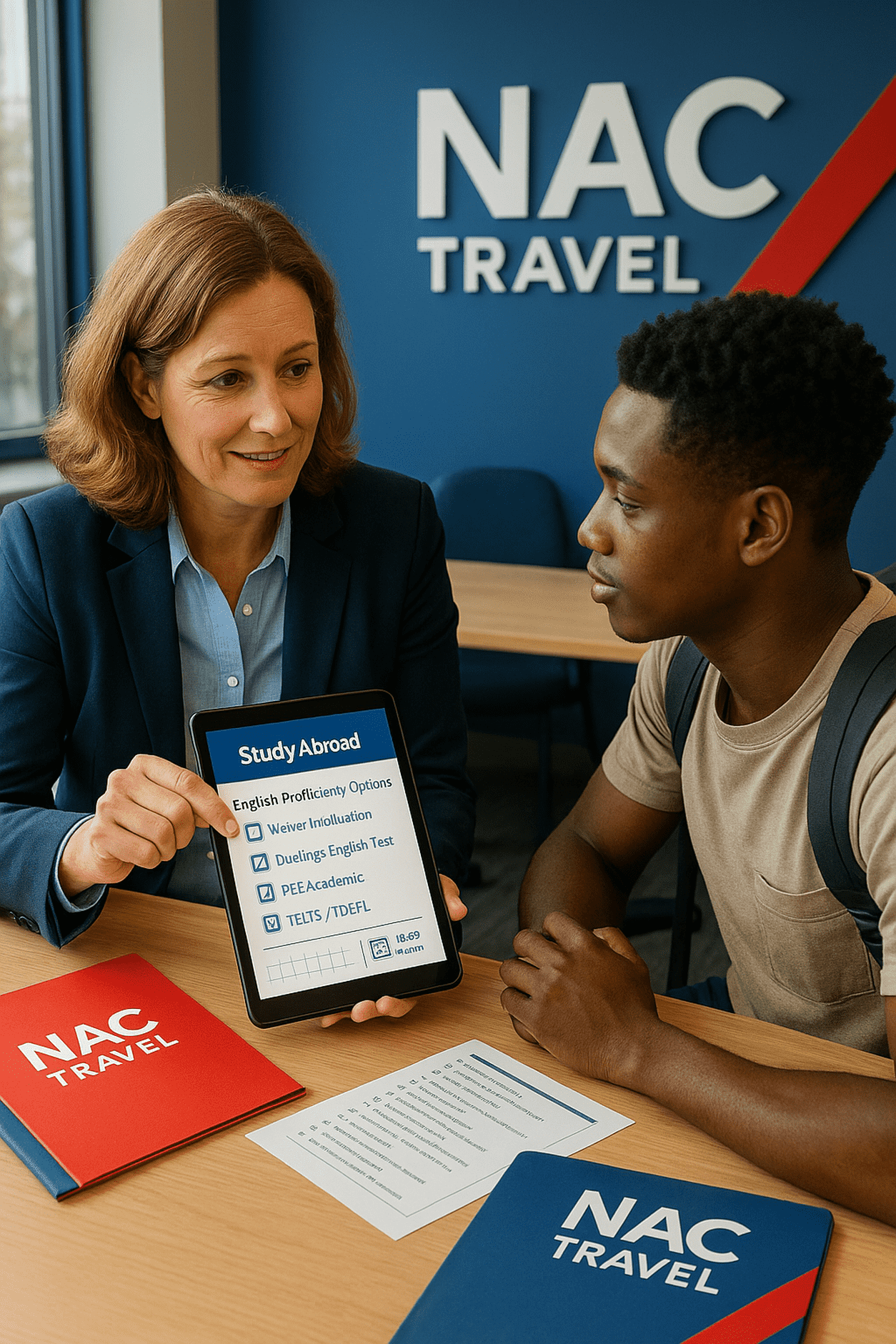Short answer: sometimes yes. Many universities now offer English test waivers or accept alternatives. The key is knowing which routes fit your profile and visa, then timing everything so you are admissible and compliant.
Below is a clear playbook, plus how NAC Travel International turns it into a step-by-step plan.
When you can often get a waiver
-
Previous education in English
-
You completed secondary school or a degree where the official medium of instruction was English.
-
You can obtain a Medium of Instruction letter from your school or university.
-
Your transcripts and school website support the claim.
-
-
Country or curriculum exemptions
-
Some universities publish lists of countries, curricula, or exam boards that qualify for waiver reviews.
-
International programs like IB or A-Levels with strong English marks can help.
-
-
Strong proof of academic English
-
High grades in English on national exams.
-
Writing samples, research projects, or published work that demonstrate advanced English.
-
-
Pathway or foundation entry
-
You enter a foundation or pre-sessional English program first.
-
Completing it can meet the university’s requirement and unlock the main degree.
-
Reality check: a waiver covers admission. Visa rules in some countries may still require an approved test. Plan for both.
Accepted test alternatives you can target
-
Duolingo English Test (DET)
-
Fully online, fast results, and widely accepted by universities.
-
Great for tight timelines or remote applicants.
-
-
PTE Academic
-
Computer-based, widely recognized, and accepted for many study visas.
-
Clear score mapping to CEFR levels.
-
-
IELTS Academic or TOEFL iBT
-
Still gold-standard at many institutions.
-
If an alternative fails or a visa requires a specific list, these remain your safety net.
-
-
Cambridge C1 Advanced or C2 Proficiency
-
Strong options for competitive programs that value rigorous assessment.
-
NAC’s rule of thumb: choose the lowest friction test that your target schools and visa both accept.
How to ask for a waiver the right way
-
Check the university’s admissions page for waiver policies.
-
Prepare evidence: medium-of-instruction letter, transcripts, national exam results, and a short statement.
-
Email admissions with a subject like “Request for English proficiency waiver”.
-
Attach documents as PDFs and keep the message under 200 words.
Mini template
Dear Admissions Team,
I am applying to the [Program] for [Term]. I completed [School or Degree] where the official medium of instruction was English. I have attached my transcripts and a Medium of Instruction letter. I would like to request an English proficiency waiver or to confirm accepted alternatives for my profile.
Thank you for your consideration,
[Name, Application ID]
Smart prep plan if you take DET or PTE
Four weeks out
-
Take an official diagnostic and learn the scoring bands.
-
Build a study calendar with 45 to 60 minutes per day.
-
Collect speaking prompts and record yourself.
Two weeks out
-
Do two full practice tests under timed conditions.
-
Focus on weakest sections only.
-
Set up your testing environment and ID checks in advance.
Final week
-
Light daily drills and two speaking rehearsals.
-
Sleep well the two nights before the test.
-
Test in the morning if possible and avoid caffeine overload.
Target scores are school specific. NAC will confirm the exact band you need for each program and visa.
Timing your decision: waiver vs test
-
If the visa requires an approved test, schedule it early even if you request a waiver for admission.
-
If universities accept DET or PTE and your visa also accepts them, choose the one with faster booking and reporting.
-
Use the waiver if it is clearly listed for your case and you can supply proof quickly.
Common pitfalls to avoid
-
Assuming a waiver covers visa as well as admission.
-
Submitting a Medium of Instruction letter without official letterhead or contact details.
-
Missing application deadlines while waiting for a waiver decision.
-
Picking a test that your top program does not accept.
-
Ignoring minimum sub-scores that some faculties require.
How NAC Travel International helps
-
Waiver mapping
We identify schools and programs where your profile is eligible for a waiver, then prepare the exact documents and the request email. -
Test strategy that matches visas
We confirm which tests your target universities accept and which tests your study visa recognizes. You get a one-page decision tree so there is no guesswork. -
Prep plan with target scores and dates
We set your score goal by school, build a four-week study plan, book the test, and schedule a retake window if needed. -
Deadline and document tracker
You receive a timeline that syncs applications, scholarships, tests, and visa filing. Every task has a date and a status. -
Plan B ready
If a waiver is denied, we pivot to a test on file with enough time to meet the deposit and visa windows.
Bottom line
Yes, you can often study abroad without IELTS or TOEFL. The winning move is to match your profile to a waiver, a recognized alternative, or a foundation route, while keeping visa compliance in view. With NAC Travel International, you get the right pathway, the right test if needed, and the right timing to secure your offer on schedule.
